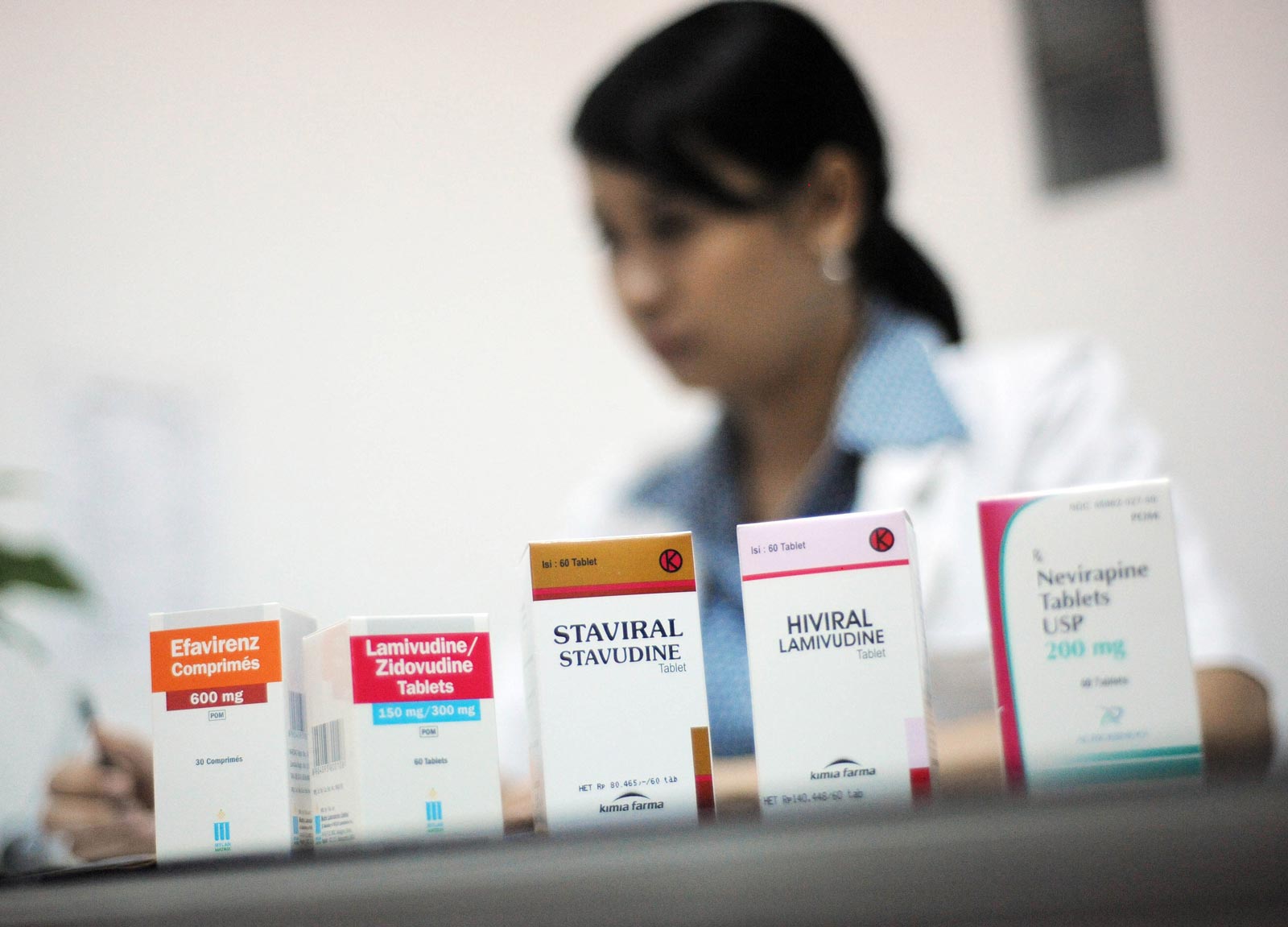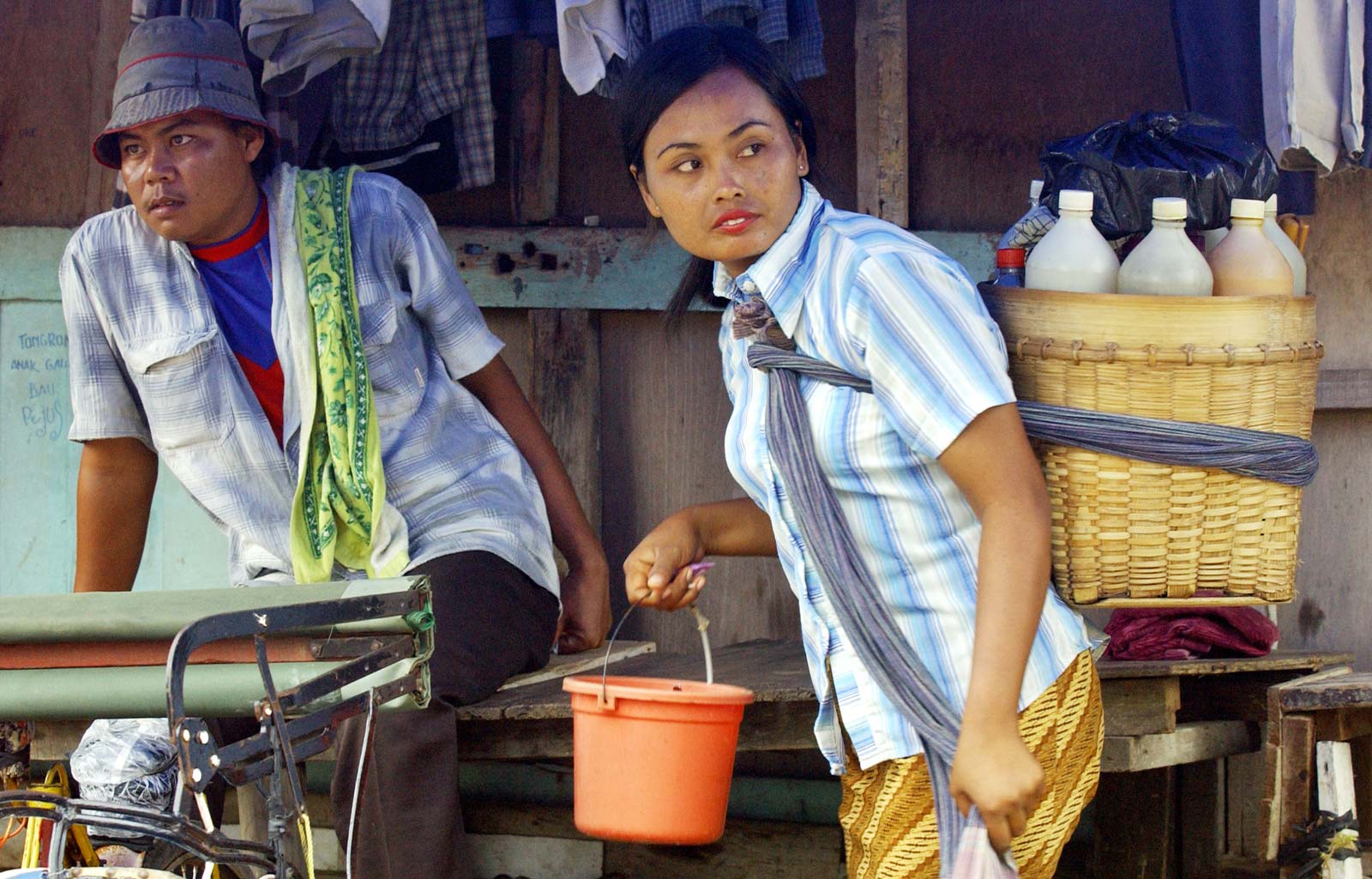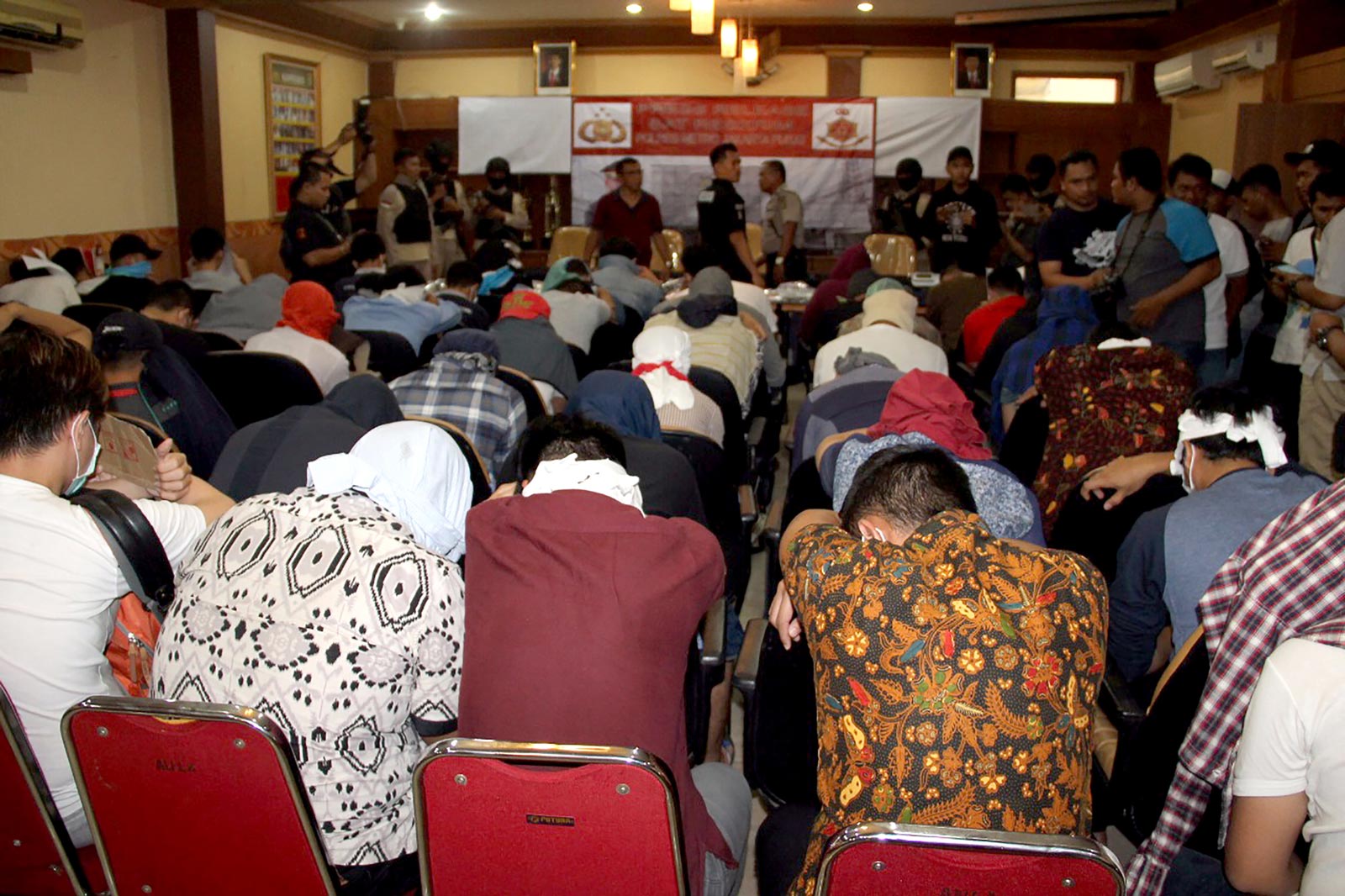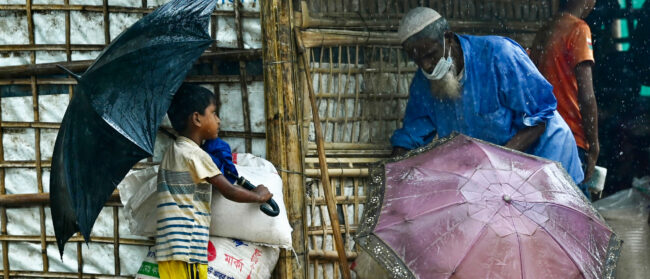When Ibra* contracted gonorrhoea, he was terrified when his doctor suggested that he also be tested for HIV.
Just 20 years old, the young man from the West Java regional capital Bandung went from scared to suicidal after he was told the test was positive.

Even though he shared a home with his father, two brothers and younger sister, he felt he had nobody to turn to, seeing his diagnosis as little more than a shameful death sentence.
Fear and isolation drove him to self-harm. “I used to be desperate and want to [join] my mother immediately in heaven,” he told Southeast Asia Globe over Facebook messenger. “If I’m depressed [or feeling] acute stress I always hurt myself… So at that time I would hurt my hand with a knife.”
In his life, Ibra had only knowingly met one other person with HIV – a fellow member of his local K-Pop dance group. Not knowing where else to look, he joined Maha Star, a Facebook group filled with thousands of other Indonesians searching for – or selling – a cure for the incurable.
But when it comes to HIV, the wrong information can be fatal.
The replies he received were relentless. “I decided to leave [antiretrovirals]”, read one response, claiming that since he had abandoned his prescribed medication he was finally “healthy again”. Another recommended he take “sambiloto honey”. “Don’t [take antiretrovirals]”, warned another. “That’s poison. [Take] herbal.”
Nicky Suwandi, project manager at online HIV information campaign testJKT, understands the danger only too well.
“I know some people who have died because of it,” he said.
*All names have been changed to hide identities
Driven underground
Fifty years since the world’s first known HIV-related fatality, the virus which leads to AIDS is no longer a death sentence. Not only is life expectancy for someone with HIV close to average in many places – if diagnosed early and treated with antiretroviral (ARV) drugs – in May this year a landmark study found that men whose HIV infection was fully suppressed by ARV drugs had no chance of infecting their partner.
That announcement came just months after the second-ever case of stem-cell therapy apparently eliminating HIV – though researchers warned that it was too early to say that the person had been cured.
While HIV no longer means an early death for those born into rich countries, the same cannot be said for people unable to access quality healthcare, or living in places where stigma stops people with HIV from seeking help. For many living with HIV in Indonesia, the nation ticks both boxes.
UNAIDS estimates that of the 630,000 people believed to be living with HIV in Indonesia, half are unaware of their status. Worse yet, fewer than one in five are on lifesaving ARV treatment, which must be taken for a lifetime.
And although the government has provided ARVs free of charge since 2004, Indonesia is one of the few nations in the Asia-Pacific that has seen a rise in new HIV infections over the past few years.

UNAIDS Indonesia country director Krittayawan Boonto said that while the government had committed to free public testing and ARV treatment, more could be done in concert with NGOs and civil society groups to ensure that what progress the country has made is shared by the whole community.
“Although the policy is there, the effort to make sure all population groups are included is not seen to be part of the government’s responsibility,” she explained. As a consequence, Boonto said, “many populations are being left behind and marginalised or even targeted.”
Indonesia’s HIV prevalence among the entire population is 0.3%, but among transgender people and men who have sex with men (MSM) this figure climbs to 24.8% and 25.8%. HIV rates among MSM have increased five-fold since 2007, according to government and UNAIDS data.
For Amahl S. Azwar, a writer who descibes himself as a “loud and proud gay man who happens to be HIV-positive”, the disparity in HIV rates between the general population and LGBT people fuels further discrimination.
“A straight housewife, for example, when they get it, there’s still a feeling off, like, ‘Oh, my God, poor them! Let’s help them,’” he said.
In contrast, Azwar feels, the reaction is often one of “‘you had it coming” when a gay man is diagnosed with HIV.
“Because of the crackdown, it is forcing people back into the closet… the sex is still happening, but people are getting more discreet”
testJKT project manager Nicky Suwandi
Homosexuality is not a crime in Indonesia. But some of the government rhetoric around the nation’s LGBT community has been frightening. Nofrijal, principal secretary of the National Population and Family Planning Board, described homosexuality as a disease that should be cured as “an enemy of development”.
In late 2016, information ministry spokesman Noor Iza announced that the ministry was asking Google to block a number of dating apps including Grindr and BoyAhoy for promoting the LGBT lifestyle and “sexual deviance”.
And the repression goes far beyond dating apps. Last year Human Rights Watch (HRW) published a report claiming that crackdowns on LGBT meeting places are fueling Indonesia’s rising HIV rates. Since 2016, the Indonesian government has backed a campaign of police raids on so-called ‘hotspots’ – private and public spaces frequented by gay or bisexual men including night clubs and saunas.
Many of these establishments – like the Atlantis Gym and Sauna that was raided in May 2017, resulting in the arrest of 141 men, ten of whom were prosecuted under Indonesia’s anti-pornography law – also provided HIV education, testing, and counselling.
Crackdowns on the LGBT community are frequently justified by government officials as necessary to prevent the spread of HIV. Epidemiologist Elisabeth Pisani, author of The Wisdom of Whores: Bureaucrats, Brothels and the Business of AIDS, said that the campaign had seen mixed success.
“The more of a crackdown there is, the harder it is for people to gather at venues,” she said. “Therefore, the harder it is to meet new partners, and the harder it is to achieve rapid HIV transmission.”
Unfortunately, this rationale cuts both ways. “It does mean, obviously, that it’s harder to easily reach people with interventions,” she said.
Andreas Harsono, HRW researcher and co-author of the 2016 report, explained that the crackdowns are making it less likely for gay and transgender people “to meet up and to talk about their psychological problems, medical problems”.
“It is less likely for the more senior members who are experienced with HIV to tell them that you should go to this hospital, or you should go to this counselling service, so the spread of HIV is getting higher and higher,” he said.

The lure of the web
As government rhetoric and police action against LGBT people make reliable information harder to access in person, more and more are logging online to find answers.
Nicky Suwandi works for testJKT, a digital campaign that aims to direct MSM to HIV testing services in the aftermath of the police crackdown.
“The virtual world and cell phone are the second hope for the MSM community, that’s the only space where they can be themselves,” he said.
“Because of the crackdown, it is forcing people back into the closet… the sex is still happening, but people are getting more discreet.”
Indonesia has become infamous in recent years for the spread of hoaxes and so-called fake news online, and HIV is no exception. While alternative medicines and treatments are nothing new in Indonesia – many Indonesians take the herbal tonic Jamu every day for a wide range of supposed health benefits – the spread of this dubious health information into the digital sphere is unprecedented.
With 57,000 Facebook members – a number slightly higher than half the total Indonesians taking ARV treatment – Maha Star is at the forefront of what has been dubbed the nation’s ‘Anti-ARV movement’. The group also has a YouTube channel where videos can achieve up to 11,000 views, and a blog with #articles, #tips, and #testimonials questioning “mainstream’ – or scientifically accepted – discourse on AIDS.
The Facebook page is awash with members lauding a long list of would-be palliatives such as sambiloto leaves, mangosteen fruit, virgin coconut oil and nigella seed oil as an alternative to ARVs.
“And you know what happened to my friend? Now it’s almost a month, and he is dying”
“Saddam”
Part of the problem is that ARV treatment isn’t always pretty. Severe headaches, vomiting, diarrhea and insomnia are common but debilitating side-effects that come in the early stages of treatment.
Stop taking them, then, and the side effects stop. It’s this immediate boost that leads many to attribute their newfound strength to whatever grab-bag of alternative medicines they’ve taken up.
“People are not idiots, they know how they feel. If they say they feel better then they probably do,’ said Pisani.
“What is happening to their viral load, and to the progressive destruction of their immune system, is another matter entirely,” she added.
Professor Harapan Harapan, who researches vaccine acceptance and vaccine hesitancy at Syiah Kuala University in Banda Aceh, told Southeast Asia Globe that treatment can be undermined by the imbalance of information between clinic and chat room.
“People in Indonesia do believe in a doctor more than strangers, but the quantity of the information is not balanced,” he explained.
Fighting back
Part of the desperation many feel to find a cure for this as-yet incurable disease is the belief that people with HIV must inevitably experience deteriorating health and social stigma for the rest of their lives. In some ways, social media can also be a force for good to dispel such myths.
Azwar has put the fear and loneliness he felt when first diagnosed behind him, taking to social media to persuade Indonesians to change their minds about HIV.
In his Twitter bio, Azwar has listed himself as “HIV+.” He hopes people might see his page and think something like: “there’s an HIV positive gay man on Twitter. And he’s okay. He’s not got six pack. He’s not muscular. But he looks healthy. So he’s fine. So I’ll be fine.”
In turn, Azwar has become something of a guru for other HIV-positive Twitter users, who pepper him with questions along the lines of “I just found out I’m HIV-positive, what should I do?” and “I feel nauseous [from ARV treatment] – how do I how do I deal with it?”
It can be frustrating work. Azwar often gets angry at what he describes as “how ignorant and how uneducated people are”. Only a few days earlier, someone posted on the Maha Star Facebook group asking “If I share a glass with a [HIV+ person], can I be infected?” HIV cannot be spread through saliva.
To counter such misconceptions, Azwar teamed up with illustrator Aria Gita to create #MenjadiPositif / #BeingPositive, a series of comic strips that he hopes can dispel some of the misconceptions surrounding HIV.
Nor is he the only one trying to make a difference. Like Ibra and many others who receive a positive diagnosis, Scott initially spiralled into a deep depression. But struggling through this, he saw a need for an online platform to empower people living with HIV by enabling them to communicate with others in the same situation.
HayVee, as it is called, is due to launch in December and will help users with some of the common challenges facing people with HIV. If someone forgets their medicine while away from home, for example, and they’re unable or scared to visit another clinic, another user of the platform might be able to help out.
“It’s like where people can help each other,” Azwar said. Premium HayVee subscribers will be able to arrange a home consultation or test and have medication delivered to their homes.
HayVee follows efforts such as the UNAIDS-run “Tanya Marlo” – Ask Marlo – a chat bot on the popular Japanese messaging app Line, where users can ask questions about HIV, link up with a counsellor or even book a test.

Fatalities
While rates of new HIV infection are decreasing, more of those who contract the virus are dying. According to recent UNAIDS estimates, AIDS-related deaths have increased by almost 60% since 2010.
Harapan hopes that governments “can tackle the misinformation that is flying around in the social media and the internet.” But when Nicky Suwandi joined like-minded NGOs in flagging the Maha Star group to health ministry officials, their response was underwhelming.
“They think that this is not a very big thing,” he lamented. “How can you think that it’s not a serious matter?”
“I worry for someone who just knows his HIV status without the right information” said Saddam, a 35-year-old advertising executive who lives in Medan. Despite his initial panic on hearing his diagnosis three years prior, he said, his life is “not much different from the lives of others”.
He takes his ARV medicine and, he says, has come to terms with his diagnosis. “I live with HIV and am happy”, he said. While he is open with some of his friends and family, including his partner who is also an HIV-positive man, he uses Twitter only under a pseudonym.
Despite being a close friend, Hendy* kept his diagnosis a secret for seven years, even from Saddam. It was only three months ago that he revealed his condition, unable to hide the toll the disease had taken on his body.
He won’t take ARVs, though. Hendy believes that the cure for HIV has already been found – but, he says, it has been deliberately hidden by the Jews, who make billions from selling toxic ARV medicine. He’s watched loads of videos on YouTube about it.
After finally being persuaded to see a doctor, Hendy was diagnosed with AIDS.
“And you know what happened to my friend?” Saddam asked. “Now it’s almost a month, and he is dying.”


